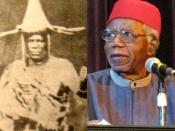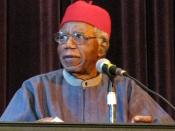"Things Fall Apart" is an amazing novel by Chinua Achebe that illustrates the conflict occurring during the period of British colonization of Africa. The novel is told from the perspective of the native people of Ibo. The novel takes place in Umuofia, in Nigeria, in an area where their culture is indigenous to the Ibo people. In "Things Fall Apart" it seems that the African Ibo culture was strong and functional, such as in its religious beliefs and customs, government, economic, and social coherence. The order of Ibo society became interrupted and began to unravel when the white missionaries entered Africa and introduced Christianity. Oknowko, the main character in the novel, is the representation of the African Ibo society and throughout the novel he begins to unravel just as the society. In "Things Fall Apart" different aspects of the African Ibo society began to fall apart such as the religious beliefs, the government, and the economic system.
Oknowko's representation in the novel leads one to believe that the society was strong. His status was based on individual merit not on heritage. He was born from a poor family and his belief system was strong. He strived to represent the economic stability within the Ibo society by his agricultural contributions. Also, his religious beliefs are evident throughout the novel, and he strongly believed in his chi. He played a role in the government, the secret society. It is capable to say that the struggles and conflicts throughout the novel are aligned with the society and Oknowno. In the end, Oknowno commits suicide and basically this is the same thing that happened to the society. There were changes due to the entrance of the white man, it was no longer the same society that had been know to the Ibo people.
The missionaries who came to Umuofia set out to reach everyone in order to convert him or her to Christianity. The missionaries had little interest in adhering to the native's customs and beliefs with the exception of Mr. Brown. They first attacked the outcasts, or osu, of the Ibo society in order to expand on the ideas of Christianity and how their belief system was not an accurate portrayal. Their main focus was to introduce Christianity, but at the same time they were taking away the value system and belief system that had been in place. An example is when Mr. Kiaga approached two outcasts and told them they must shave their hair in order to let go of their heathen beliefs. Once this was done they could enter the church. The Ibo society believed that once you were an outcast you were not worthy of a razor and if you dare to touch one you will die. In a sense by disavowing their old belief system, the missionaries were creating a new belief system. The missionaries gave examples of how their belief system was not accurate, such as the missionaries taking care of twins, and even in the case of shaving their heads. No one died in either situation. The Christians even lived in the Evil Forest in order to prove that their belief system was not accurate. The traditional belief system had been corrupted by the impact of the missionaries and there was encouragement of disavowing the traditional beliefs of the Ibo society.
The Ibo society had no centralized government. The government was basically democratic. The elders were mainly in rule and other groups played their roles in the government process, such as the secret societies that were masked men who sat and listened to judicial issues and made verdicts when necessary. After the entrance of the missionaries, the government basically disintegrated and the white man set up there own government. The arrival of the English laws alters the Ibo's way of life with regard to the adhering to the rules of the society. For example, the white courts had decided how to distribute land that was in dispute. The white courts disregarded the Ibo's customs about land. The white men took cruel measures in imposing their power. An example is when the district commissioner invites the leaders of the clan for a meeting for a discussion and then arrests them. They are imprisoned and on the third day released by paying a fine of two hundred fifty cowries. These men were the government representatives before the whites courts came and there positions in the Ibo society were not sufficient as authority figures after the entrance of the white man.
In addition to the religion and government falling apart, the white man also brought economic changes. The economic status prior to the European colonization was based on trade among the Ibo people and agricultural development. The Ibo societies main agricultural products were yams, and they traded yams for goods needed. However, the missionaries opened trading post and expanded on palm-oil and kernel. These things became great valued and brought a lot of money into Umuofia. The society was based on cooperating and working with each other in order to function as an economic entity. The missionaries basically stripped this from the society by putting in the trading post. The society was now based on the white mans perspective of a "great" economic society, which basically meant adhering to the capitalistic views of the white man. There became little resistance to the economic gains that came about by the white man. The Ibo society had become a thriving economical society.
In conclusion, as one can see, the religion, government, and the traditional economic development of the Ibo society fell apart. The structure of the societies government fell apart because of the white man's court and could not recover from this drastic change. The period of colonization disrupted the order of societies roles in the economic development that had been indigenous to their culture. They created trading posts in order to demonstrate the need for a stronger economic society. The missionaries created a sense of disbelief for their religious and cultural values and belief system. The society lost its characteristics as an indigenous society because of the entrance of the white missionaries during the colonization period of Africa.


